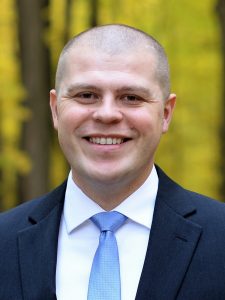
Greg Henson serves as President at Sioux Falls Seminary where he has worked with his team to develop several new approaches to both financial and educational models within theological education. As a published author and speaker on the topics of theological education, innovation, generational theory, missional theology and competency-based education, Greg seeks to help people see the unique opportunities that exist within the challenges we face in the church and in theological education. Learn more about Greg here.
What excites you about CBTE?
What excites me is CBTE’s potential for empowering disruptive innovation in an industry that greatly needs it. When fully embraced, the CBTE philosophy enables schools to think integratively about curriculum and the ways in which that curriculum is delivered. It also helps schools to explore how educational and operational models are deeply interconnected.
What excites you about participating in the CBTE 2018 conference?
In the world of community development there is a philosophy that the people with challenges often have best solutions to them. Theological education is an industry in need of change and CBTE 2018 will bring together people who are wrestling with that need and wrestling with challenges in their context.
People engaged in CBTE could be tempted to declare, “We have the solution! The answer is CBTE and you do these things and take these steps.” But that would be dangerous and would fail to take account for the importance of context. It is much better to have a diverse group of people who are wrestling with various challenges interacting with those who have experimented with this philosophy of education. That synergy and interaction has the potential to bring about a lot of new ideas and approaches and I’m very excited about what may emerge!
What are you sharing at CBTE 2018 and how does it add to the conversation?
I am going to be talking about how CBTE is an educational philosophy, not a model. It isn’t a step-by-step process that any school can just take off the shelf, so to speak. It is an educational philosophy that has to be thought through and wrestled with in order to be applied and integrated into the context and mission of the school.
I think this opens us up to immense possibilities and that conversation will lend itself to methods, programs and applications that are unique to the school and to the students. It will allow us to invite conversation around the philosophy that we can all benefit from.
Who do you think will benefit most from the conference?
Well, there are really two questions there: “Who will benefit?” and “Who will benefit most?” As far as the first question, I think anyone who is trying to find a new way forward in theological education will benefit. Anyone who is saying, “There has to be a new way to approach theological education,” or, “There has to be a better way for denominations to be engaged.” Anyone who is saying, “I want to be involved in theological education but I just don’t have any faith in the system.” I think the conference will speak to them. It will resonate; it will be encouraging and refreshing.
As to, “Who will benefit most?” I think it is anyone who is looking to discover the CBTE philosophy and has an influential voice or leadership role. So faculty, deans, vice-presidents of enrollment or denominational leadership or anyone who holds a position like that. They will see practical steps forward and have the opportunity to encourage change in their institutions.